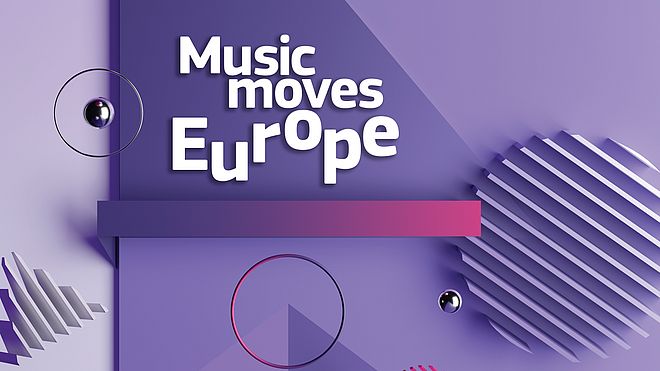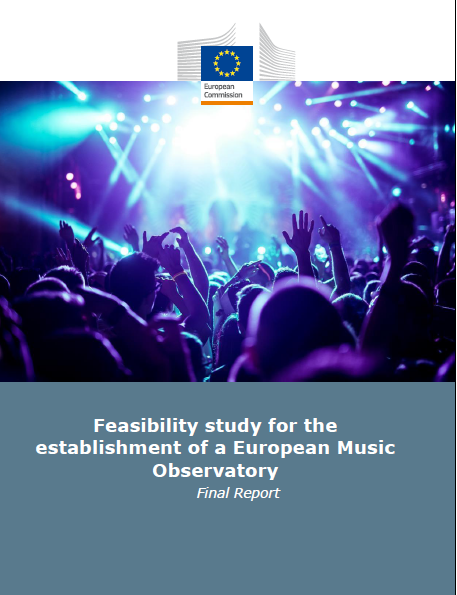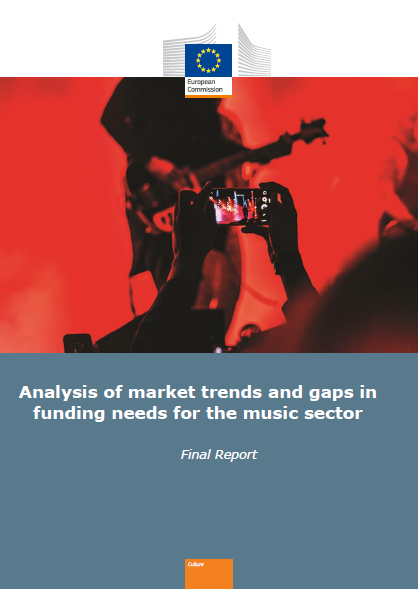What about music in the EU?
About Music Moves Europe
Music Moves Europe is the framework for the European Commission’s initiatives and actions regarding the European music sector. The process started in 2015 with meetings between the European Commission and stakeholders from the music sector to identify the main challenges facing the sector. Since then, MME has been developed in different phases. On this page, you can find information about Music Moves Europe actions and initiatives over the years:
- Music Moves Europe in Creative Europe (since 2021)
- Music Moves Europe Preparatory Action (2018 - 2020)
- Background (since 2015)
Music Moves Europe in Creative Europe
Since the start of the current Multiannual Financial Framework (MFF) in 2021, Music Moves Europe is part of the Creative Europe programme. So far, two calls have been published for MME in Creative Europe:
- Dialogue and cooperation in the context of "Music Moves Europe" (500 000 Euro), 2021
- Sustainable music distribution with a focus on live music (4.5 million Euro), 2022
The Music Moves Europe Talent Award is also part of Creative Europe. Several music projects have also been funded through cooperation projects, networks, platforms and cultural entities.
Call for Tender: strengthening the dialogue with the music sector
This open call for tenders aims at strengthening the dialogue with the music sector in Europe for the next years. The services to be provided will mainly consist of three tasks, including:
1. A request for conceptual work to provide an updated definition on Europe’s music ecosystem. This will include a short literature review, providing an overview and analysis of music ecosystem policy - both academically and professionally. This will serve the purpose to better understand what a music ecosystem is, what its diverse component parts are, how it can be defined in a European context and linked to the existing definition of “CCI ecosystem” and what the advantages are to work with such an approach/definition as a basis for a strengthened EU dialogue on music. TASK 1 shall be performed first, and shall last for no longer than 3 months
2. Creating a series of Music Moves Europe dialogue meetings (max. 3 per year) at major music conferences in Europe, involving music professionals and focusing on topical themes for the sector that have relevance for EU and national policy making on music. The aim of this task is to strengthen the dialogue within the music sector and with its professionals, on topical issues with a European dimension, by using the well-established music conferences in Europe.
3. An EU level conference on music (at least every second year), involving the EU institutional level, Member States’ representatives and representative European music organisations/associations to take stock of developments relevant for the music sector at large, and to steer the EU policy agenda on music. The first conference shall take place indicatively in the first semester of 2023. The second indicatively in the first semester of 2025.
This call will implement the new sectorial action on music, under the Annual Work Programme 2021 of Creative Europe.
The expected duration of the contract is 48 months.
Find out more here
Music Moves Europe Talent Award

The Music Moves Europe Talent Award is the new European Union Prize for popular and contemporary music awarded every year to emerging artists who represent the European sound of today and tomorrow. The prize succeeds the European Border Breakers Awards (EBBA). Nominees are selected through monitoring the European Border Breakers Charts, their streaming figures, results from the European Talent Exchange Programme (ETEP) and recommendations from music export offices, as well as the partners involved in the prize. The Music Moves Europe Talent Awards are represented by Eurosonic Noorderslag (ESNS) and Reeperbahn Festival, in cooperation with Yourope, the European Broadcasting Union (EBU), Independent Music Companies Association (IMPALA), International Music Managers Forum (IMMF), Liveurope, Live DMA, European Music Exporter Exchange (EMEE) and Digital Music Europe (DME).
Preparatory Action
The Preparatory Action “Music Moves Europe: Boosting European music diversity and talent” was launched with several calls for proposals in 2018, 2019 and 2020 to test dedicated funding strands for the music sector.
The following calls for proposals were published:
- Training scheme for young music professionals
- Online and offline distribution
- Co-creation and co-production
- Music education and learning
- Professionalisation and training
- Cooperation of small music venues
Addtionally, the following calls for studies and cascading grants were published:
- Feasibility study for a European Music Observatory and funding gaps in the music sector
- Study European Music Export Strategy
- Export of European music
- Health and wellbeing of music creators
- Innovative support scheme for a sustainable music ecosystem
Results of the Preparatory Action
MusicAIRE - An Innovative Recovery for Europe
MusicAIRE aims to assist the recovery of the music sector by designing and testing a support scheme that can meet the challenges posed by the pandemic while fostering the sustainability of the ecosystem. It aims to support the music ecosystem to emerge from the COVID-19 crisis in a green, digital, just and resilient way. Two calls for proposals were launched in MusicAIRE (February 2022, September 2022) to distribute in total 2.2 million Euro to the music sector funding in total 51 projects.
The project is funded by the Music Moves Europe Preparatory Action and is implemented by Inova+ and the European Music Council.
Feasibility study for the establishment of a European Music Observatory
The lack of data in the music sector has been discussed for several years. Robust and meaningful comparative data collected at a regular basis are essential when it comes to assessing the need for interventions at the EU level to address gaps in the market and enhance the efficiencies and global competitiveness of the sector. The fragmented, scarce and poorly-harmonised nature of the data collection landscape in the field of music has led to calls from within the sector supporting the creation of a European Music Observatory that can act as a centralised music data and an intelligence hub at European level. This study investigates the possible development of a future full-scale establishment of a data collection organisation, a European Music Observatory, as a core strategic resource to drive relevance and value for future policy actions in the music portfolio and across the sector. Specifically, the study analyses different options for the set-up and operation of an Observatory, taking into account the specific characteristics and requirements of the European music sector.
The study was funded by a Music Moves Europe Preparatory Action and conducted by Panteia and KEA. The EMC was part of the Advisory Board and many EMC members contributed to the study through consultations and interviews.
Analysis of market trends and gaps in funding needs for the music sector
The European music sector is rich and diverse but faces many challenges. The EU has a key role to play if it wants to support a competitive, diverse and sustainable music sector, which is challenged by 1) concentration trends in the recorded and in the live music sub-sectors; 2) the fast-evolving consumptions habits and; 3) decreasing funding for core musical institutions. The music sector has painfully re-structured after the digital shift, but it remains fragile and requires tailored measures in order to strive in a competitive global music market. Whilst some support schemes exist at different levels of governments – from local to national and European – they fall short in terms of complementarity. Current European funding is only partially aligned with the strategic needs of the sector. This study investigates possible EU action to address some of these gaps and calls for more appropriate funding and support mechanisms by proposing concrete proposals for actions.
The study was funded by a Music Moves Europe Preparatory Action and conducted by Panteia and KEA. The EMC was part of the Advisory Board and many EMC members contributed to the study through consultations and interviews.
A European Export Strategy
The study defines the background, the scope, and proposes a set of measures for a European music export strategy. Following the analysis of the main characteristics of the music sector in the European Union, this report takes stock of the main obstacles, challenges and opportunities faced by European music when crossing borders. Building on this stocktaking exercise, a “European music export strategy” is described, through a set of objectives, target groups and measures, including innovative funding schemes and policy approaches, reflecting the need to include music sector stakeholders and policymakers both at national and European level. A proposal for the articulation and the implementation of the European music export strategy is formulated, with key expected results in terms of market structuration, policy developments, data collection and cross-border circulation of European music.
The report was funded by the Music Moves Europe Preparatory Action and conducted by le bureau export as lead partner, with Music Austria, KEA European Affairs, and
Factory 92 as well as contributions by European Music Exporters Exchange (EMEE).
The health and wellbeing of professional musicians and music creators in the EU
The report "The health and wellbeing of professional musicians and music creators in the EU. Insights from research for policy and practice" highlights the main risks for the physical and mental health of professional musicians and music creators with examples of succesful policies and practices from several EU Member States. It provides key policy lessons and gives recommendations on education, prevention and treatment and highlights these three key messages: 1) National and local authorties should pay attention to all aspects of health and wellbeing including performance anxiety, loneliness, and social anxiety, financial insecurity, noise-induced hearing loss, depression and others. 2) Every higher education music school curriculum should include a substantial and compulsory component on psychological and mental wellbeing risks and prevention. 3) National, regional and local authorities should ensure that mental and physical therapy are not excessively expensive for music creators.
The study was funded by a Music Moves Europe Preparatory Action and conducted by KU Leuven, idewe and LUCA School of Arts.
Music Moves Europe Calls 2019
In 2019, 3 mio. Euro are available in the second phase of the Preparatory Action "Music Moves Europe". Four calls for proposals and two calls for tender will be published.
- Co-creation and co-production (grant)
At least 8 European musical co-creation or residencies' schemes for musicians and professionals, open to all music genres and to collaboration across musical sub-genres.
Budget: 400,000 Euros
Deadline extended: 30 April 2020, 13:00
Funded projects - Music education and learning (grant)
8 innovative approaches to foster music education and learning.
Budget: 300,000 Euros
Deadline: 30 April 2020, 12:00
Funded projects - Professionalization and training (grant)
At least 10 training programmes for young musicians and professionals in the music sector with a clear European added value.
Budget: 900,000 Euros
Deadline: 31 October 2019, 12:00 (closed)
Funded projects - Co-operation of small music venues (grant)
At least 13 projects on identification, development and showcasing of innovative operation models of small music venues across Europe.
Budget: 400,000 Euros
Deadline: 20 December 2019, 13:00 (closed)
Funded projects - Export of European music (procurement)
Based on findings and recommendations of the upcoming music export strategy (developed in the framework of a 2018 call for tender).
Budget: 400,000 Euros
Call for tender
Deadline: 24 September 2020 - Health and wellbeing of music creators (procurement)
Exploration of specific health issues that musicians are facing during their career and recommendations should be developed to address the problems identified, including possible further policy actions.
Budget: 150,000 Euros
Deadline: 3 February 2020, 13:00 (closed)
Call for tender
Music Moves Europe Calls 2018
Training scheme for young music professionals
The aim of this call for proposals was to identify and support 10 pilot training programmes for young music professionals. Lessons learnt from these projects should feed into an integrated strategy for music support for the next generation of EU funding programmes after 2020. Deadline for this call for proposals was 27 August 2018.
Training scheme for young music professionals
Online and offline distribution
This call for proposals aimed at identifying and supporting up to 10 online or offline distribution projects, initiatives and start-ups to promote diversity and increase the circulation of European music repertoire across Member States and to address existing obstacles, such as national fragmentation along with language barriers, which hamper promotion and visibility of music repertoire across national borders within Europe. Deadline for this call for proposals was 10 September 2018.
Online and offline distribution
European Music Observatory
This general objective of this call for tender was to elaborate a feasibility study for the establishment of a European Music Observatory, and undertake a gap analysis of funding needs for the music sector. Deadline for the receipt of tenders was 2 July 2018.
Feasibility Study European Music Observatory
European Music Export Strategy
The general objective of this call for tender was to develop a proposal for a European Export Strategy that promotes Europe's music diversity and talent beyond European borders and that enhances the competitiveness of Europe's music sector on the international market. The Strategy should help national and European policy makers to take more informed decisions with regard to music export and enable decision makers in the music sector to adapt or align their choices in that field. The deadline for this call for tender was 29 June 2018.
Study on a European Music Export Strategy
Background Music Moves Europe
The outcomes of this dialogue can be found the AB Music Working Group report. The report outlines the need to support music creation, promote musical diversity and to explore the opportunities offered by music online and offline distribution. The Commission has formulated as its ultimate goal to strengthen the EU’s political and financial support of the sector. As a first step, a Prepatory Action “Music Moves Europe: Boosting European music diversity and talent” was launched with several calls for proposals in 2018, 2019 and 2020 to test dedicated funding strands for the music sector. Since the start of the Multiannual Financial Framework in 2021, Music Moves Europe is part of the Creative Europe programme.
The EMC has participated in the AB Music Working Group and closely follows the debates towards a possible EU music funding programme. The EMC participated in the “Music Moves Europe” pavilion at Midem 2017 in Cannes and Reeperbahn Festival in 2017 presenting the objectives towards a European Agenda for Music. Anna Athanasopoulou, Deputy Head of Unit at the Directorate General Education and Culture (DG EAC) participated in the European Forum on Music 2017 in Pafos and updated participants on the most recent developments regarding “Music Moves Europe”.
Seizing the momentum, the EMC joined IMPALA and a broad range of organisations in this letter (download here) directed to all institutions urging the EU to support a dedicated European Music Programme.
In 2019, the European Commission started a Structured Dialogue with the music sector to explore possible elements for new EU support for the music sector and exchange on the developments of the sector. Find out more here










